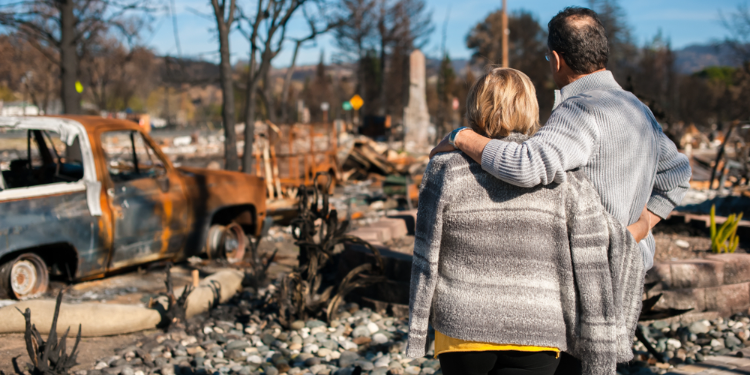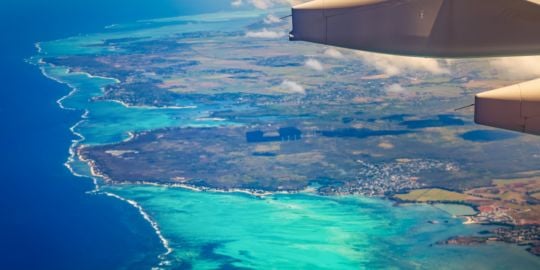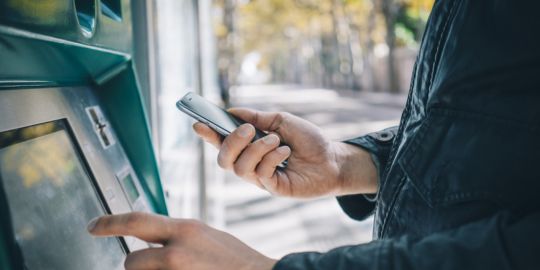Assess how vulnerable your expat country is
As climate change accelerates, many expat hotspots are becoming increasingly vulnerable to natural disasters. Before even taking the plane, you should conduct research about your new country's vulnerability to climate change and its frequency of natural disasters. This way, you will know which precautionary measures to take.
Countries of the Pacific Ring of Fire (East Asia, the west coast of the American continent, New Zealand, and the Pacific islands) are vulnerable to volcanic eruptions, earthquakes and tsunamis. Small islands like the Maldives and Mauritius are vulnerable to flooding, especially along the coast – where expats might choose to live to be close to the beach. A large part of Australia is vulnerable to wildfires, which are bushfires rendered uncontrollable by climate change. Europe, China and other parts of the world have experienced intense heat waves, also driven by climate change, in the last few years. These are just some examples of climate risks in different parts of the world.
How to prepare for a natural disaster
Countries that are vulnerable to natural disasters usually have a disaster management system in place to minimize damage and allow life to return to normal as quickly as possible post-disaster. For example, earthquake drills are regularly organized by Japanese schools and cities: people, including children, learn to duck for shelter at the sound of alarms, organize classmates/colleagues to leave buildings safely, use fire extinguishers and perform first-aid. Most buildings in the country, even skyscrapers, are also built to be earthquake-proof – the structures are more likely to sway than collapse.
To cite another example of disaster preparedness, Australian authorities have created Emergency WA (Western Australia), a website with a map-based display of the latest information about any dangers in the region, natural or man-made, even early signs like small bushfires. The United States' Federal Emergency Management Agency (FEMA) has a similar downloadable application that not only tracks weather events in real-time but also shows you emergency shelters in your area. You should check if your country of expatriation has similar tech resources available. Of course, you should also always closely follow the weather report of your expat country of through traditional channels like the TV and radio.
Upon buying or renting a house in an at-risk region, you should get a homeowners or renters insurance plan that covers natural disasters likely to happen there. Fires, tornadoes and damage from snow are usually covered by standard insurance plans, according to Investopedia, but earthquakes and flooding are not. Water damage from a burst pipe is included in a standard plan, but that is considered different from flooding as a natural disaster. Hence, you should instead get an additional flood or earthquake policy on top of your standard insurance. These policies are costly, but some are subsidized by the state in high-risk regions. For example, the National Flood Insurance Program in the United States subsidizes some flood insurance. In Japan, earthquake insurance can be attached to your fire insurance plan.
It's also important to have an emergency kit in your house and car. What should be in that kit? The Red Cross and the US government's Ready Campaign recommend having drinking water, a week's supply of ready-to-eat and non-perishable food (e.g., jerky, tinned food), a can opener, a Swiss knife and other tools like wrenches, a flashlight, a cell phone with chargers, a battery-powered portable radio, extra batteries, a first-aid kit, essential medication for a week, warm clothes and sturdy shoes, a blanket, dust masks (to filter contaminated air), a whistle (to signal for help), plastic sheeting and duct tape (to create a shelter), moist towelettes (personal hygiene), garbage bags, a map of the area, a copy of personal documents (e.g., passport, proof of address, ID card, insurance policies), family and emergency contact information, and some extra cash in your emergency kit.
It's best to have a second emergency kit in your car in case it's no longer possible to enter your house to retrieve the first one. You should have already located escape routes inside your house in case of a fire or flood. Your family should also decide on a meeting point (locatable on the emergency map) in case you get separated during a disaster.
Who to reach out to for information or help
You can also enquire with your country's embassy and company (especially if you're being posted abroad with an expat package) about their evacuation plans. You should leave your address and contact information with the embassy so that they know where to find you in case of an emergency.
In addition to having the number of the local police and fire services, also keep the number of relief organizations like the Red Cross and UNICEF in your emergency kit. Community organization is also crucial – join citizen groups on social networks that can help each other during emergencies. The experience of fellow expats can be a rich source of information, especially when the local authorities do not provide clear-enough guidelines.
For example, on the forum of Expat.com, Camie127, a Haitian-American looking for information about moving to the Dominican Republic, asked for advice about choosing an area where earthquakes are less likely to happen. Camie127 had suffered from PTSD (post-traumatic stress disorder) after the 2010 earthquake in Haiti and would not like to relive that. She was advised by other expats in the Dominican Republic to move to the north of the island, as well as to choose a recently built house because old houses were not built according to (relatively new) earthquake-proofing regulations.
On another thread of the Expat.com forum, expats in the Philippines share their experiences in learning to recognize the signs of an earthquake. For example, Nz0, a French expat who was living in the Philippines in 2016, says that at first, he thought that the slight tremors were his own migraine or indigestion. Such firsthand accounts give nuanced information that is difficult to find in general guidelines, like paying attention to tremors that might first seem banal.
Recovering from a natural disaster
Experiencing natural disasters can be highly traumatic, to the point of causing PTSD (post-traumatic stress disorder), anxiety and depression. This is especially the case if a person has lost family, friends or substantial property during the disaster or if they had a near-death experience.
Expats often consider returning home or moving to another country (or region) after these experiences. For example, on the forum of Expat.com, pby92, a French expat in the Philippines, says that waking up to his bed shaking “like in a remake of the Exorcist” during an earthquake made him seriously consider moving to Thailand. Another expat in the Philippines, coach53, who is originally from Sweden, says that he has chosen to live in Palawan rather than on the other islands/provinces of the archipelago because it has experienced less intense earthquakes.
The memoir Wave: Life and Memories after the Tsunami by the Sri Lankan economist Sonali Deraniyagala is a recommended read to learn more about the process of grief after experiencing a natural disaster. Deraniyagala suffered extreme loss – she lost her parents, husband and two sons, her entire family, during a tsunami on the Sri Lankan coast in 2004. If you are experiencing PTSD after a natural disaster, it's recommended to seek professional help from a therapist. After major natural disasters, therapy is often provided pro bono by both state authorities and NGOs.
On the financial side of things, after being affected by a natural disaster, you will likely be eligible for allowances, grants and loans. For example, in Australia, if you can demonstrate that your income has been affected by a natural disaster in the short term, you can receive a Disaster Recovery Allowance (DRA) for 13 weeks.
In the United States, you can receive a loan with low-interest rates – called the Small Business Administration's (SBA's) disaster loan – to rebuild your small business after a natural disaster, as well as tax relief when you file your yearly IRS forms. That is, if your region has been declared a major disaster area by the US federal government, you can deduct your estimated losses from your next tax return.
After the disastrous 2011 earthquake and tsunami, the Japanese government launched the “Japan as One” job-creation scheme to provide financial assistance to those affected. Victims were employed in public reconstruction projects, and companies were given subsidies to hire victims, among other measures. The employment insurance benefit – which provides an allowance to people who have lost their jobs for reasons beyond their control (here, a major natural disaster) – was also extended to a longer period.
While a natural disaster is a challenging experience to live through, with the right support system, and depending on the extent of the loss/damage suffered, you can often recover from it both emotionally and financially. And in cases where you can't fully recover, the most important thing is to at least manage to resume a fairly normal life.
















